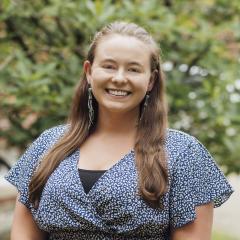About Darcey's Work
Darcey Evans is a PhD Candidate in Anthropology at the University of California, Santa Cruz. Her PhD research examines the politics and ecological consequences of Atlantic salmon aquaculture in British Columbia and Washington State. In particular, she focuses on the spread of salmon viruses to describe how salmon aquaculture can have harmful social and environmental effects beyond farm boundaries. In centering her research on the Indigenous-led efforts to track pathogens throughout salmon populations, she explores how grassroots virus monitoring efforts can offer new possibilities for Indigenous science and sovereignty.
While working on her dissertation, Darcey worked with the environmental justice organization, Save California Salmon, to advocate for educational and water policy reform in California. She led the development of the Advocacy and Water Protection in Native California Curriculum, which centers Indigenous knowledges, histories, and landscape management practices within high school social studies, science, and language arts classes. The curriculum was recently recognized as a UNESCO Green Citizen’s Project and is currently being implemented by Tribes and school districts in Northern California. Throughout her graduate career, Darcey has also served as a Science Mentor to high school students in Santa Cruz County, supported the ability for California residents to participate in state environmental processes, and participated in several state-wide and national workshops, such as the National Tribal Climate Change Leadership Summit and the Bay Area Teach-In for Social Justice.
Darcey is a Karuk member of Quartz Valley Indian Reservation in the Klamath Basin of Northern California. Many of her professional and personal endeavors stem from her undergraduate experience participating in five months of research with Tribes of the Klamath Basin, the US Fish and Wildlife Service, and the US Forest Service as a participant in the Klamath Basin Tribal Youth Program. Based in and around Quartz Valley and Karuk territories, the program was specific to her heritage and afforded her the opportunity to become better acquainted with the peoples and landscapes of her ancestry.
